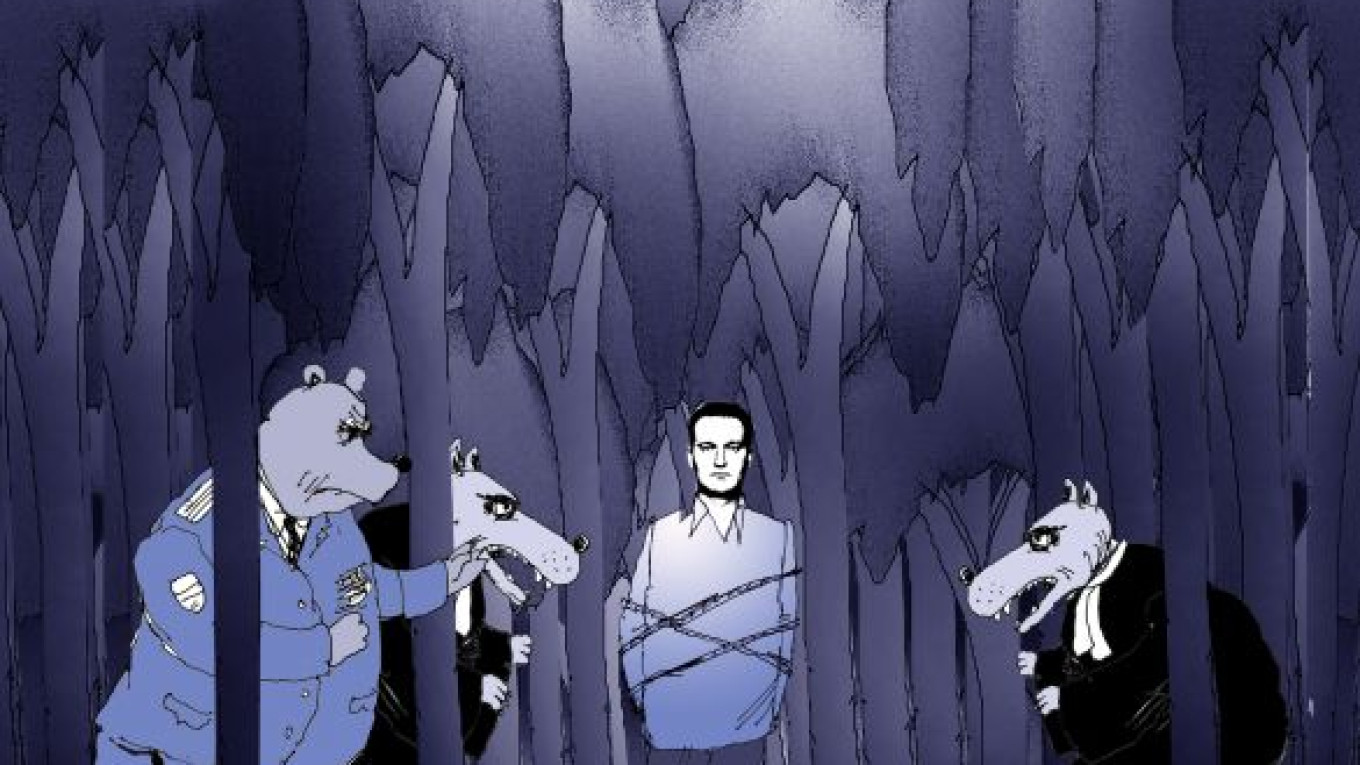Will the authorities jail opposition leader Alexei Navalny, whose trial on corruption charges will begin in Kirov on April 17? Will the authorities jail a man who last week announced his intention to run in the 2018 presidential election?
According to a recent survey by the Levada Center, more than one-third of Russians know who he is. Recognition of Navalny continues to grow even though he has been denied access to all state-?controlled television channels. In the two years since he founded the RosPil anti-corruption project, his recognition has risen from 6 percent in April 2011 to 37 percent in March. But only a small minority are prepared to vote for him as a presidential candidate. President Vladimir Putin is still favored by a majority of the voters.
The number of people who believe in the veracity of Navalny's corruption revelations against public officials is decreasing, dropping from 64 percent in the summer of 2012 to only 54 percent today. This is largely attributable to Navalny's lack of access to television. Navalny has already gained as much support as he can from Internet users, and he is blocked from using television to make further inroads with voters. The authorities continue to hold the upper hand in that regard. They will leverage their near-monopoly on television coverage to the fullest advantage during the trial against Navalny next week, just as they used television to successfully discredit the leaders of the December 2011 street protests.
Now Navalny's name will only be heard on the news and in pseudo-documentaries in a negative context, and viewers will be bombarded with the conviction that he is as much a thief as those he exposes. Navalny has been charged with embezzling 17 million rubles ($515,000) from a state-owned timber company. Although he posted material on the Internet proving the absurdity of those charges, it is unlikely that many people will ever see those documents or take the time and effort to study them.
In today's Russia, the authorities can easily charge any businessperson, politician or activist with any crime they want. Adding to Navalny's troubles, one of his former colleagues has already been convicted in the timber case and has reached an agreement with investigators. That will make it nearly impossible for Navalny to prove his innocence in court. In fact, fewer than 1 percent of all criminal cases in Russian courts end in acquittals, and Navalny will certainly not be an exception. My prediction is that Navalny will be jailed for up to 10 years, the maximum sentence for the charges he is facing.
Some liberal critics of the government say that by persecuting Navalny, the authorities are actually making him into a political martyr who will oust them from power once he is free. Yet the same was said about former Yukos CEO Mikhail Khodorkovsky. He has been sitting in jail for nearly 10 years, and his cause has been all but forgotten in the West and in Russia. Even if there are no further charges brought against Khodorkovsky and he is freed in 2014, nobody believes he has a chance against Putin — if for no other reason than convicts are prohibited by law from holding public office.
Moreover, Russia has no mass political movement that enjoys popular support and is capable of sustaining a long-term, systematic struggle to press a set of demands, just one of which would be to free Navalny. It is safe to assume that the general public is largely indifferent to Navalny's criminal case in the small, remote city of Kirov. The authorities were prudent to try the case far away from Moscow.
The most support Navalny is likely to get is two or three small, isolated pickets, some articles expressing outrage in liberal newspapers and a handful of speeches by public figures calling for his release. No massive street protests will be staged on his behalf. The Russian people are disappointed with such protests, having seen in the last year that they not only failed to produce the desired results but also prompted leaders to further clamp down on civil society with a host of repressive new laws.
For the West, if Khodorkovsky is indeed released in 2014, this might even serve as "compensation" for Navalny's incarceration, which is further reason to believe that Navalny's fate will be all but ignored. Moreover, one more Russian opposition leader behind bars will not change its fixed, negative opinion of the Putin regime. The U.S and the European Union have already limited dialogue with Russia outside a few areas involving oil and gas deliveries and national security that are of vital concern to both sides.
The only thing that might save Navalny from a lengthy prison sentence is if Putin and his inner circle conclude that the blogger's exposures of corruption among top officials will help them oust unwanted figures from the government and further consolidate their hold on power. But don't count on this.
Georgy Bovt is a political analyst.
Related articles:
A Message from The Moscow Times:
Dear readers,
We are facing unprecedented challenges. Russia's Prosecutor General's Office has designated The Moscow Times as an "undesirable" organization, criminalizing our work and putting our staff at risk of prosecution. This follows our earlier unjust labeling as a "foreign agent."
These actions are direct attempts to silence independent journalism in Russia. The authorities claim our work "discredits the decisions of the Russian leadership." We see things differently: we strive to provide accurate, unbiased reporting on Russia.
We, the journalists of The Moscow Times, refuse to be silenced. But to continue our work, we need your help.
Your support, no matter how small, makes a world of difference. If you can, please support us monthly starting from just $2. It's quick to set up, and every contribution makes a significant impact.
By supporting The Moscow Times, you're defending open, independent journalism in the face of repression. Thank you for standing with us.
Remind me later.


